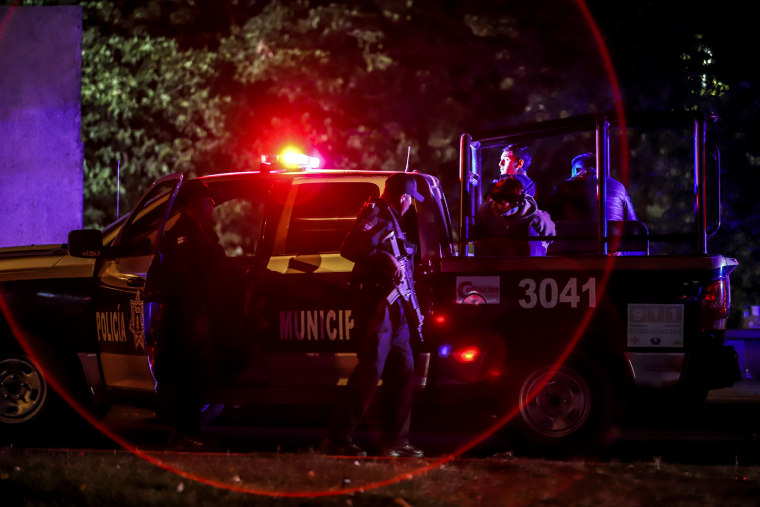An ambush that killed several American citizens living in Mexico has President Donald Trump calling for a war on drug cartels.
But the U.S. and Mexico have long tried to tackle the bloody, violent drug scourge south of the border and the cartels behind it — and they have fallen short.
Nine U.S. citizens, including six children, were killed in the attack Monday on a caravan of families on a highway connecting the Mexican border states of Sonora and Chihuahua.
After the incident, Trump tweeted Tuesday morning: “This is a time for Mexico, with the help of the United States, to wage WAR on the drug cartels and wipe them off the face of the earth.” He wrote, “We merely await a call from your great new president!”
Mexican President Andrés Manuel López Obrador responded to Trump's tweet by saying at a press conference that he was going to provide Trump “all the collaboration that is necessary” to investigate the attack, “but while taking care of our sovereignty first.”
Trump's tweet is not the first time he's told a Mexican president he wanted to help take out drug cartels and their leaders. Soon after his inauguration, The Washington Post reported that Trump told then-President Enrique Peña Nieto that he had some “tough hombres,” saying “we are willing to help you with that, big-league.”
Mexico and the U.S. have a long history of fighting the cartels, but homicides, which are mostly drug related, hit a new high of almost 36,000 in 2018 and are occurring at about 90 slayings a day, according to an Oct. 22 report by the Council on Foreign Relations.
In 2007, President George W. Bush and Mexican President Felipe Calderón forged a partnership known as the Mérida Initiative with the aim of tackling drug violence, corruption, border security, traffic flow and judicial reforms which continued under other U.S. and Mexican presidents.
But since Mexico began waging anti-drug campaigns in 2006 and despite U.S. help, more than 300,000 homicides have occurred. For decades, some critics have argued that the increased militarization of the war against the cartels has not rooted out corruption and flaws in Mexico's judicial system.
Meanwhile, dating back to the Nixon administration, the U.S. has waged its own war on drug consumption, which is what keeps the cartels in business. Yet, today, it contends with continued flows of illegal drugs such as fentanyl, from Mexico into the United States, while arms and money flow south into Mexico.
Fighting migrants, not cartels?
The U.S. and Mexico have made bilateral attempts to short-circuit drug cartels, with some success at some points, but are now falling short.
Earl Anthony Wayne, a public policy fellow at the Wilson Center’s Mexico Institute in Washington, said Mexico’s previous administration dropped the priority of dealing with crime and violence and López Obrador inherited the results.
In the Trump administration, there has been more attention to migrants, he said.
In addition, the recent capture and incarceration of drug kingpins like Joaquín "El Chapo" Guzmán, while significant, has resulted in more disperse crime organizations. Mexican economist Giovanni Marquez told The New York Times that "Mexico does not have the capacity to deal with the splintering of the cartel and the vast network that is the Sinaloa cartel."
Wilson Center's Wayne says that fighting the cartels has to be an extensive, multipronged effort.
“There needs to be a well-organized struggle against drug traffickers using all the tools we have in a more coordinated way and it needs to be integrated with attacking addiction and the demand side too,” Wayne, a former ambassador to Mexico under President Barack Obama, said.
The U.S. has appropriated $3 billion in aid through the Mérida Initiative, but funding has declined with the Trump administration, who requested $76.3 million for 2020, 35 percent less than requested in 2018, according to the Council on Foreign Relations.
López Obrador, who ran on a promise to fight violence and corruption, declared an end to the drug war in January. He said then the Mexican army would no longer prioritize capturing cartel bosses. He has focused more on social programs than on force, although he created a national guard.
But López Obrador has had to defend his security strategy since the Oct. 17 shootout in Culiacán, Sinaloa, between Mexico’s security forces and cartel gunmen following the capture of Ovidio Joaquín Guzman, one of Guzmán's children. The mayhem left 13 police officers dead. In the end, Mexico’s security officers released Guzmán's son.
In an Aug. 23 report for the Wilson Center, Wayne wrote that Mexican National Guard troops that are helping to deal with Central Americans heading north are not available to stop drug organizations in other parts of Mexico.
Among other things, Wayne called for a fresh review of the Mérida Initiative and said remarks by Lopez Obrador “suggest he does not understand well the bilateral cooperation that has developed over the past decade.”
Along the border, the countries should be investing in high-tech scanners that can find drugs, money and arms. Investing in the scanners would be “smarter than building infrastructure where no one lives and you can cut through.”
Trump has made building a border wall a priority of his administration. The Washington Post reported Saturday that smugglers have repeatedly sawed through portions of the wall with power tools.
“It’s time for both sides to double down in a coordinated way to make it harder for these cross-border criminals to operate,” Wayne said. “Not just at the border, wherever they operate.”
Follow NBC Latino on Facebook, Twitter and Instagram.


